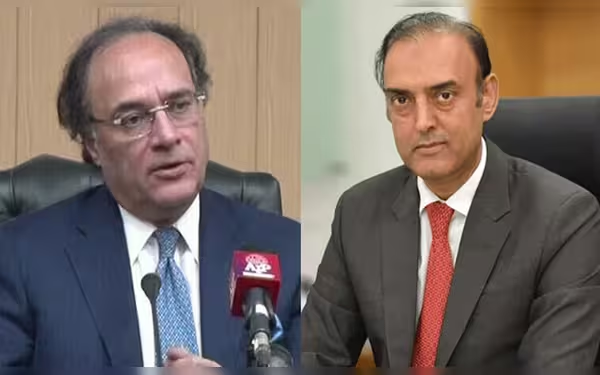Friday, October 18, 2024 02:32 PM
Finance Minister and SBP Governor Sign IMF Agreement for Economic Stability
- Pakistan signs $7 billion IMF agreement with 22 conditions.
- Government to phase out Special Economic Zones by 2035.
- New measures aim to enhance transparency and fiscal responsibility.
 Image Credits: gnnhd
Image Credits: gnnhdPakistan's Finance Minister and SBP Governor sign IMF agreement to stabilize economy with 22 conditions, including phasing out SEZs by 2035.
Islamabad has recently witnessed a significant development in its economic landscape as the Finance Minister and the Governor of the State Bank of Pakistan (SBP) have officially signed agreements with the International Monetary Fund (IMF). This agreement comes as part of the $7 billion Extended Fund Facility (EFF), which includes the approval of 22 specific conditions aimed at stabilizing Pakistan's economy.
One of the key commitments made by the Pakistani government is to phase out Special Economic Zones (SEZs) by 2035, with a detailed plan to be developed by June 2025. This decision reflects the government's intention to streamline economic activities and ensure that resources are utilized more effectively. The phased approach indicates a careful consideration of the potential impacts on businesses and employment within these zones.
In addition to the SEZs, the government has agreed to adjust gas tariffs by December 2024 and to impose a 5 percent Federal Excise Duty (FED) on fertilizers and pesticides in the upcoming 2025-26 budget. These measures are expected to generate additional revenue for the government while also addressing the financial challenges faced by the agricultural sector.
To enhance the effectiveness of its anti-corruption framework, the government plans to amend the Civil Service Act by 2025. This amendment will facilitate digital filing and public access to the assets of high-level public officials, ensuring transparency while protecting personal information. Furthermore, the Federal Board of Revenue (FBR) will develop a stable framework for asset assessment, which is crucial for maintaining public trust.
Pakistan's government is also aiming for net zero revolving credit flows by the fiscal year 2025. This ambitious goal will be pursued through a combination of timely tariff hikes, targeted subsidies, and cost-cutting reforms in the power sector. The IMF has highlighted that Pakistan's ability to service its debt is at significant risk, emphasizing the need for effective policy implementation and timely external financial support.
In a related context, security concerns have prompted the imposition of Section 144 in five districts of Punjab, following a blast at Karachi Airport that has been termed a conspiracy to undermine Pakistan-China relations. This situation underscores the complex interplay between economic stability and national security.
The agreements signed with the IMF represent a critical step for Pakistan as it navigates through economic challenges. While the conditions set forth may seem stringent, they are designed to foster a more sustainable economic environment. The government's commitment to transparency, fiscal responsibility, and anti-corruption measures will be vital in restoring confidence among investors and the public alike. As Pakistan embarks on this journey, it is essential for all stakeholders to remain engaged and proactive in ensuring the successful implementation of these reforms.













